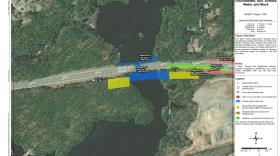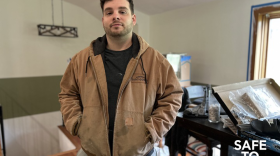New Hampshire is suing the giant agrochemical company Monsanto for allegedly knowingly causing water contamination with cancer-causing chemicals called PCBs, which have tainted fish and harmed loon populations across the state.
The suit filed Tuesday in Merrimack County Superior Court targets Monsanto and two of its spin-off companies, seeking damages to cover potentially widespread testing and clean-up costs.
For decades, Monsanto made almost all of the nation’s PCBs, or polychlorinated biphenyls, for a range of construction uses – from window and door caulk to electronic insulation.
The chemicals were banned in the U.S. in the late 1970s, after being linked to cancer, birth defects and other health issues. But they’re still common in older buildings, and have turned up in the state's natural resources.
The state says PCBs have contaminated more than 63,000 acres of inland and Atlantic Ocean surface waters. They say the chemicals got into loon eggs and reduced the threatened birds’ population, including on Squam Lake.
PCB contamination has also led to warnings against eating fish from rivers like the Souhegan, near one of multiple Superfund sites where PCBs are part of ongoing remediation.
“We know it’s a problem; we know it’s a big problem,” Senior Assistant Attorney General Allen Brooks said in an interview with NHPR. “But we have more work to do to figure out exactly just how extensive this PCB contamination is.”
The suit asks for damages to pay for a sampling program for PCB contamination in soil, water, fish, wildlife and public buildings, as well as the past, present and future costs of any investigation and remediation.
Brooks said the state is working with new evidence, including some recently uncovered in similar suits, that shows Monsanto covered up the toxic effects of PCBs on humans and wildlife.
"They knew about it, and they very clearly said that they're going to go through with this anyway and market as much PCBs as they could."
"They have acknowledged the harm internally, they've acknowledged all the impacts, and they knew about it,” Brooks said. “And they very clearly said that they’re going to go through with this anyway and market as much PCBs as they could, out to the people. And that happened in New Hampshire and other states as well.”
Monsanto is now owned by Bayer, based in Germany, and it previously spun off its chemical business into two companies: Solutia and Pharmacia, now owned by Pfizer. New Hampshire’s suit names those two firms as well as Monsanto.
In a statement, Bayer said it’s reviewing the suit but believes it’s “without merit.”
“Monsanto voluntarily ceased its lawful manufacturing of PCBs more than 40 years ago, and never manufactured, used, or disposed of PCBs nearby or into New Hampshire’s waters, and therefore should not be held liable for the contamination alleged by the state,” the statement said. “Where it has been determined that that cleanups are necessary, federal and state authorities employ an effective system to identify dischargers and allocate clean-up responsibilities.
"Litigation of the sort brought by the state risks undermining these efforts," Bayer's statement said.
Earlier this year, the companies paid $170 million to settle separate PCB contamination lawsuits with the states of Washington and New Mexico, and Washington, D.C.
Monsanto and Bayer have also proposed a federal settlement fund of at least $650 million for more than 2,500 local governments that have brought similar PCB claims.
New Hampshire’s suit is in state court for now. Brooks declined to comment on whether his office expects the case to move to federal court as part of that larger settlement proposal.
New Hampshire is part of another multi-district federal suit, against PFAS chemical-makers 3M and Dupont and several manufacturers of PFAS-based firefighting foam. As in the PCB case, the state's initial PFAS suit alleges that the companies hid knowledge of health risks and cleanup challenges.
These stories of buried industry science also echo the tobacco industry, and Exxon, which, documents show, spent decades concealing internal evidence that fossil fuel use would lead to harmful climate change.
New Hampshire won $236 million from Exxon in its 2015 MtBE water contamination lawsuit. That settlement continues to fund drinking water infrastructure upgrades statewide.
This story has been updated to include a statement from Bayer, which now owns Monsanto.








